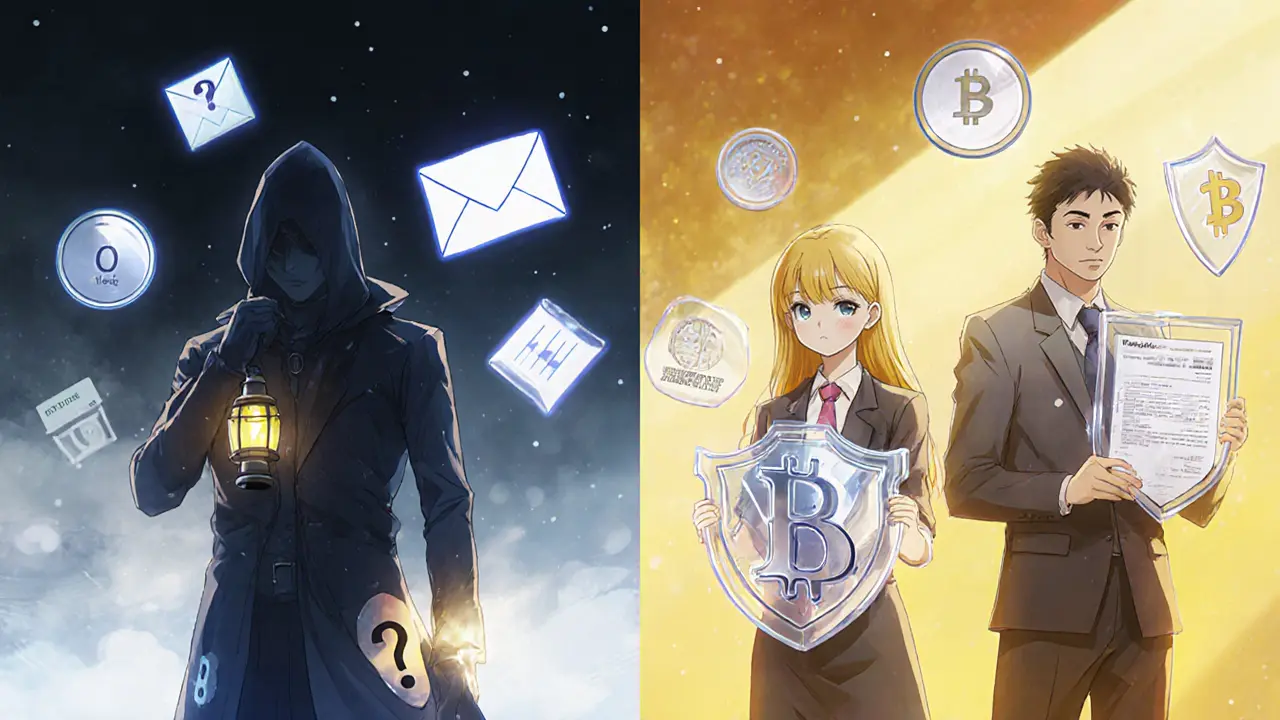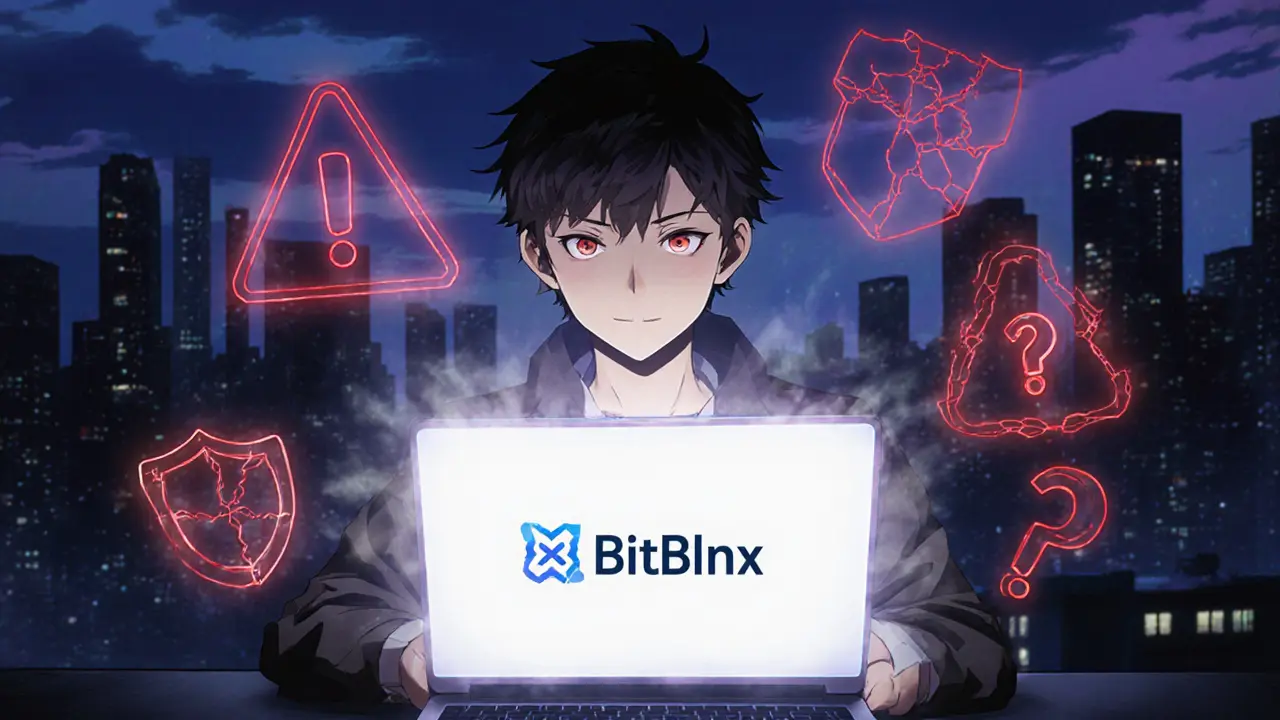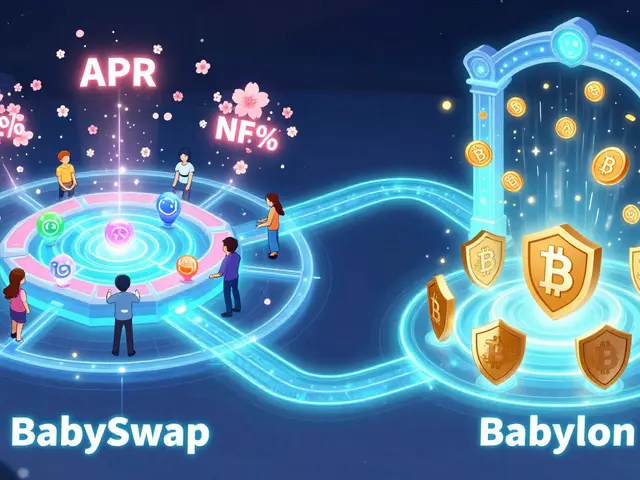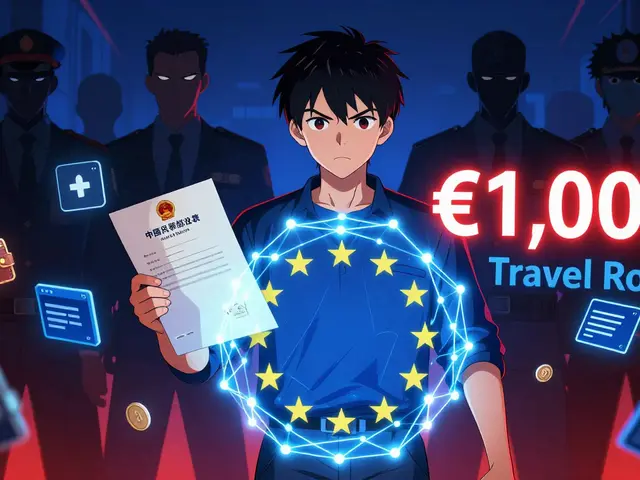Crypto Exchange Risk Checker
When you hear the name BitBlinx is a crypto exchange that claims to provide fast trades and low fees but has virtually no footprint in reputable industry reviews or regulator listings, the first reaction should be caution.
- BitBlinx is not mentioned by any major 2025 exchange comparison sites.
- Regulators such as the California Department of Financial Protection and Innovation have no record of it.
- Red‑flag patterns include limited withdrawal options and vague fee structures.
- Established platforms like Coinbase and Kraken offer transparent terms and strong support.
- If you still want to test BitBlinx, start with the smallest possible amount and verify the withdrawal process.
What is BitBlinx?
BitBlinx markets itself as a "next‑generation" exchange, promising sub‑0.2% trading fees, a wide range of altcoins, and a sleek mobile app. However, the platform does not disclose a launch year, licensing jurisdiction, or audited financial statements. In the crypto world, such opacity is a strong indicator that the service may not be regulated.
Why the Absence from Reputable Sources Matters
Major review sites-DayTrading.com, NerdWallet, and Koinly-maintain directories of over 500 exchanges. Their methodology includes direct API testing, user experience scoring, and compliance checks. BitBlinx is nowhere to be found in any of these databases, which raises two possibilities: it is either brand new and untested, or it operates outside the regulatory framework that reputable reviewers require.
To illustrate the gap, the California Department of Financial Protection and Innovation maintains a public crypto‑scam tracker. BitBlinx does not appear on that list, but the lack of any mention-positive or negative-means the agency has not verified its legitimacy either.
Red Flags to Watch for on BitBlinx
- Unclear fee schedule: The website lists "low fees" without specifying maker/taker rates, withdrawal fees, or any tiered discounts.
- Limited KYC transparency: While the platform claims KYC is required, it provides no details on the data it collects or the verification partners it uses.
- Withdrawal bottlenecks: Users report that small withdrawals (e.g., $50) process instantly, but larger withdrawals trigger a request for a "risk premium"-a classic scam tactic documented by U.S. regulators.
- No live support: The only contact method is an email form with a quoted 48‑hour response time, and there is no phone or live‑chat option.
- Absence of regulatory licensing: No information on whether BitBlinx holds a BitLicense, a Malta e‑money license, or any other recognized crypto‑exchange permit.
Side‑by‑Side Comparison with Established Exchanges
| Feature | BitBlinx | Coinbase | Kraken | Binance US | Gemini |
|---|---|---|---|---|---|
| Launch year | Unknown | 2012 | 2011 | 2019 (U.S. version) | 2015 |
| # of cryptocurrencies | Unclear (claims 200+) | 235 | 350+ | 158 | 120 |
| Fee range (maker/taker) | “Low” - not disclosed | 0.00% - 3.99% | 0.00% - 0.40% | 0.00% - 0.60% | 0.50% - 3.49% |
| Regulatory status | Not listed with any regulator | U.S. Money Transmitter License | U.S. Money Transmitter Licenses (multiple states) | U.S. Money Transmitter License | U.S. Money Transmitter License |
| KYC required | Yes (details hidden) | Yes | Yes | Yes | Yes |
| Customer support channels | Email only (48‑hr response) | Email, phone, live chat | Email, live chat, ticket system | Email, live chat | Email, phone, live chat |
| Withdrawal limits | Small withdrawals allowed; large withdrawals trigger “risk premium” request | Up to $25,000/day (higher with verification) | Up to $100,000/day (higher with tier) | Up to $50,000/day | Up to $20,000/day |

How to Evaluate Any Crypto Exchange (Checklist)
- Verify licensing: Look for a clear regulatory identifier (e.g., BitLicense, FCA registration).
- Check fee transparency: A reputable exchange lists maker/taker rates, withdrawal fees, and any volume‑based discounts.
- Test withdrawal before depositing large sums: Send a tiny amount, withdraw it, and confirm the process is smooth.
- Assess security measures: Two‑factor authentication, cold‑storage percentages, and recent security audits should be publicly documented.
- Review support options: Live chat, phone, and a responsive ticket system are signs of a serious operation.
- Read independent reviews: Trusted outlets like NerdWallet, CoinDesk, or the official crypto‑scam tracker provide unbiased perspectives.
- Look for exchange tokens: Legit platforms often issue a token (e.g., BNB, FTT) that offers fee discounts-if none exists, the platform may lack a mature ecosystem.
Safer Alternatives for U.S. Traders
If you decide the risks outweigh any potential upside, the following exchanges have proven track records in 2025:
- Coinbase: Strong regulatory compliance, easy UI, 235 crypto pairs, fees up to 3.99% but offers an institutional tier for lower rates.
- Kraken: Over 350 assets, 0%‑0.40% fees, robust security, and 24/7 live chat for premium users.
- Binance US: Deep liquidity, 0%‑0.60% fees, and a BNB discount program that can bring fees down to 0.075%.
- Gemini: Simple UI, regulated in all 50 states, fee schedule from 0.5% to 3.49% with clear explanations.
Practical Steps If You Still Want to Test BitBlinx
- Create a brand‑new email address solely for the test.
- Complete the KYC process but keep the deposited amount to the smallest possible value (e.g., $10).
- Execute a simple buy‑sell trade, then immediately request a withdrawal to the same address.
- Document the time taken, any additional fees, and the communication you receive.
- If the withdrawal fails or asks for a “risk premium,” stop using the platform and withdraw any remaining funds immediately.
Key Takeaways
BitBlinx's lack of visibility in industry reviews, missing regulator listings, and vague fee structure are classic warning signs. Established exchanges such as Coinbase, Kraken, Binance US, and Gemini provide transparent terms, solid security, and reliable support. When evaluating any platform, use the checklist above, start with tiny amounts, and never ignore the red‑flag patterns that have tripped up countless traders.
Frequently Asked Questions
Is BitBlinx a registered crypto exchange?
There is no public record of BitBlinx holding a money‑transmitter license, BitLicense, or any other recognized crypto‑exchange registration as of October2025. The absence of such documentation suggests it is not regulated.
What are the most common red flags for fraudulent exchanges?
Typical warning signs include unclear fee tables, limited customer support, withdrawal delays that require extra fees, lack of KYC detail, and no presence on regulator or reputable‑review lists.
How does the fee structure of BitBlinx compare to Coinbase?
Coinbase clearly lists fees ranging from 0.00% to 3.99% depending on the transaction type. BitBlinx merely advertises “low fees” without publishing specific maker or taker rates, making direct comparison impossible.
Can I safely withdraw funds from BitBlinx?
Small test withdrawals have been reported to work, but larger withdrawals trigger a request for a "risk premium"-a tactic commonly seen in scam platforms. It is safest to avoid large withdrawals until the platform’s legitimacy is proven.
Which regulated exchange should I use instead?
For most U.S. traders, Coinbase, Kraken, Binance US, and Gemini meet regulatory standards, provide transparent fees, and have responsive support. Choose the one that aligns with your trading volume and preferred UI.












Katrinka Scribner
November 3, 2024 AT 02:08 AMWow, this review really opened my eyes! 😱 The red flags on BitBlinx are scarier than a horror movie 😅. No clear licence, vague fees and that "risk premium" on withdrawals? That's a recipe for disaster 🚨. If you value your crypto, stick to the big names that actually publish their stuff. Stay safe out there, fam! 🙏
Jacob Anderson
November 3, 2024 AT 18:48 PMOh look, another "next‑generation" exchange with zero transparency. Sounds like someone copied a marketing template from 2012 and hoped no one would notice. If you enjoy gambling with your savings, by all means, test the waters. Otherwise, keep your money where you can actually see it.
Oreoluwa Towoju
November 4, 2024 AT 11:28 AMKey things to check: licensing, fee list, support channels, withdrawal speed, KYC details. Compare against known platforms. Start tiny, verify, then decide.
Amie Wilensky
November 5, 2024 AT 04:08 AMOne might argue that the lack of public regulation is merely an oversight, however, when a platform omits fundamental information-such as licensing credentials, fee disclosures, and verifiable support avenues-one must question the very foundation upon which it claims to operate; the absence of these pillars is not a neutral void but a deliberate opacity that, in my view, signals heightened risk, especially in a market already rife with speculative ventures.
Charles Banks Jr.
November 5, 2024 AT 20:48 PMBitBlinx? Yeah, they say "low fees" but don’t actually show them. That’s like a restaurant saying "best prices" without a menu. Good luck figuring out if you’ll get ripped off or not.
Ben Dwyer
November 6, 2024 AT 05:08 AMStart with a $10 test trade, pull it back out, and see how they handle the withdrawal. If it’s smooth, you can think about scaling up a bit, but always keep most of your capital on a trusted exchange.
Lindsay Miller
November 6, 2024 AT 21:48 PMIt’s scary when a service hides details. Stick with places that are clear and honest, it will give you peace of mind.
Waynne Kilian
November 7, 2024 AT 14:28 PMYo, I read the same thing. If you want real safety, go with a big exchange that actually lists its rules – no point in playing hide‑and‑seek with your money.
Michael Wilkinson
November 8, 2024 AT 07:08 AMEnough with the fluff! BitBlinx looks like a scam in the making. Demand full transparency or walk away!
Kate Nicholls
November 8, 2024 AT 23:48 PMThe checklist in the article is solid – any platform missing those basics should be avoided.
Jason Brittin
November 9, 2024 AT 16:28 PMHonestly, the red‑flag list says it all. 🤔 If you love drama, try BitBlinx, otherwise keep it simple with the big guys. 🚀
VICKIE MALBRUE
November 10, 2024 AT 00:48 AMStay safe and keep learning.
Naomi Snelling
November 10, 2024 AT 17:28 PMDid you know they might be secretly funneling user funds to an offshore shell? The lack of oversight is exactly what the shadow network thrives on. Keep your eyes open.
Billy Krzemien
November 11, 2024 AT 01:48 AMIt’s wise to stay skeptical, but remember that not every unlisted platform is a conspiracy. Verify through multiple sources before drawing conclusions.
Clint Barnett
November 11, 2024 AT 18:28 PMWhen evaluating any crypto exchange, the first principle to keep in mind is transparency – a term that should be reflected in clear licensing information, publicly available fee structures, and open communication channels.
Without these, you are essentially signing a contract with an unknown party, which in the financial realm is tantamount to walking blind into a dark alley.
Regulatory oversight serves as a safety net; an exchange that proudly displays a BitLicense, FCA registration, or equivalent demonstrates compliance with established standards.
Fee transparency is equally crucial – the difference between a 0.10% maker fee and a hidden 2% withdrawal surcharge can erode profits dramatically over time.
Support availability is another pillar – an email‑only system with a 48‑hour response window indicates limited resources and can exacerbate issues during urgent situations.
Know Your Customer (KYC) policies should be detailed, outlining exactly what data is collected, how it is stored, and who the verification partners are; vague statements hide potential data misuse.
Withdrawal processes often reveal the true character of an exchange: instant small withdrawals are normal, but large‑scale delays or “risk premiums” are red flags that mirror classic scam tactics.
Security measures such as two‑factor authentication, cold storage percentages, and regular third‑party audits are non‑negotiable for safeguarding assets.
Beyond the checklist, community reputation plays a vital role – frequent mention on reputable review sites, positive user feedback, and inclusion in regulatory databases enhance trust.
Consider the ecosystem: does the platform have its own token, staking options, or integration with other DeFi services? A mature ecosystem often signals long‑term viability.
Liquidity depth is another metric; shallow order books can lead to slippage and unexpected price impacts during trades.
Finally, always perform a small test transaction – deposit a minimal amount, execute a trade, and attempt a withdrawal to observe real‑world performance.
These layered steps collectively form a robust due‑diligence framework, reducing exposure to hidden risks and protecting your capital in an often volatile market.
Carl Robertson
November 12, 2024 AT 02:48 AMAh, the saga continues! Yet another eloquent manifesto that pretends to demystify the abyss, while the very act of preaching reveals the author's own insecurities. If you think a 16‑sentence lecture can substitute for real evidence, you’re living in a fantasy.